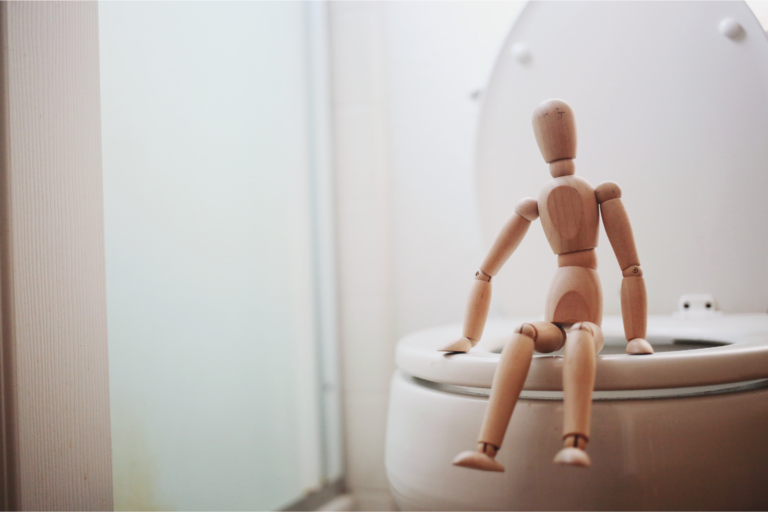Why Does Poop Turn Black? Causes & When To See a Doctor
Key Takeaways:
Black, tarry stools may indicate a serious medical condition causing GI bleeding, like stomach ulcers or certain cancers.
Other common causes of black poop include iron supplements, medications containing bismuth, activated charcoal, dark-colored foods, dehydration, or trauma to the GI tract.
Seek medical help immediately if you notice black, tarry stools or if changes to your poop color occur with other symptoms such as vomiting, dizziness, fatigue, or bloating.
Just like with green poop, black stool can be caused by what you eat. However, dark black poop is also a sign of potentially serious or even fatal health conditions.
Let’s take a look at the causes of black stools and how to know when it’s time to see a doctor.
1. Gastrointestinal bleeding
Gastrointestinal (GI) bleeding is a common cause of black stool. Your poop may turn very dark when there is bleeding in any part of the digestive tract, which includes the esophagus, stomach, small intestine, large intestine, rectum, and anus.
Red blood in your stool (rectal bleeding) is often an indication of bleeding in the lower GI tract, while black poop typically suggests bleeding higher in the gastrointestinal tract.
If you suspect that you have GI bleeding, it is essential to consult a healthcare provider right away. Only a pro can diagnose the underlying cause, which may or may not be severe.
When bleeding occurs in the upper GI tract (esophagus, stomach, or duodenum), blood mixes with the digestive enzymes, gastric acid, and partially digested food. This leads to the formation of black, tarry stools known as melena.
Melena is dark, sticky, and tar-like in appearance. It also smells much worse than the average poop. The partially digested blood and other compounds from your gut are what change its consistency and color.
The longer the blood stays in the digestive tract, the darker the stool becomes.
You may also notice other symptoms that suggest GI bleeding, such as:
- Abdominal pain or cramping, especially burning pain (common with bleeding ulcers)
- Weakness or fatigue
- Dizziness or lightheadedness
- Shortness of breath or difficulty breathing
- Rapid heart rate or palpitations
- Vomiting, especially when you notice blood or material that resembles coffee grounds
- Unexplained weight loss
- Pale or clammy skin
- A swollen belly/bloating
- Frequent heartburn
- Burping
- Difficulty swallowing (which may be a sign of esophageal cancer)
- Frequent coughing
The presence of melena may not always be accompanied by other symptoms. Pay attention to any changes in stool color or consistency (like yellow or pale poop), and let your healthcare provider know if you notice black bowel movements for any prolonged period of time.
Several medical conditions can cause GI bleeding and result in black stool. These include:
Bleeding ulcers
Peptic ulcers are sores in the stomach lining or the beginning of the small intestine (duodenum) caused by a bacterial infection or long-term use of certain medications, such as NSAIDs. When these stomach ulcers bleed, they can change your poop’s color to black.
People who drink a lot of alcohol, frequently take NSAIDs (like Tylenol), or have an H. pylori infection are most at risk for stomach ulcers.
A bleeding ulcer is the most common serious cause of black stool.
Mallory-Weiss tear
A Mallory-Weiss tear is a laceration in the lining of the esophagus or stomach resulting from severe vomiting or retching. You may experience additional symptoms when you have a Mallory-Weiss tear, such as vomit resembling coffee grounds, diarrhea, dizziness, or fainting.
These tears may repair themselves without treatment, but you may need to talk to your healthcare provider to stop the bleeding.
Gastritis
Inflammation of the stomach lining, known as gastritis, can lead to bleeding and melena. Gastritis can be caused by:
- Inflammatory bowel disease conditions (Crohn’s disease and ulcerative colitis)
- Frequent or binge alcohol drinking
- Infections (like H. pylori)
- The use of nti-inflammatory medications
Esophageal varices
These enlarged veins in the esophagus, often caused by liver disease (like cirrhosis), can rupture and bleed. You might notice other symptoms that indicate esophageal varices, like:
- Fainting/dizziness
- Throwing up blood
- Bloating
- Bruising
- A yellow tint to your skin and eyes (which may indicate jaundice)
You’ll need hospitalization to treat this condition, which may include an endoscopy to tie off veins and stop the bleeding or IV medications to lower pressure in the enlarged veins.
Intestinal ischemia
Intestinal ischemia is a condition characterized by decreased blood flow to the intestines, which can lead to insufficient oxygen supply for the cells in the digestive system. This can cause black and/or tarry stools due to internal bleeding from damaged intestinal tissue.
Risk factors for intestinal ischemia include:
- Age (people over 50 are more susceptible)
- Smoking
- Atherosclerosis (buildup of fatty deposits in arteries)
- Heart and blood vessel problems
- Certain medications
- Blood-clotting issues
- Other health conditions (e.g., high blood pressure, diabetes, high cholesterol)
- Recreational drug use (e.g., cocaine and methamphetamine)
Intestinal ischemia can be acute, with sudden onset, or chronic, developing gradually. Both types can cause abdominal pain, diarrhea, nausea, vomiting, and bloating. If you experience these symptoms, consult a doctor immediately for proper diagnosis and treatment.
Tumors (benign or malignant)
Benign or cancerous growths in the esophagus, duodenum, ampulla of Vater, or stomach can cause bleeding and black stool. Other symptoms that may occur to indicate tumors and/or cancer along with darker poop include:
- Constipation
- Diarrhea
- Nausea and/or vomiting
- Unexplained weight loss
- Difficulty swallowing
- A burning sensation when you defecate
- Hoarseness
- Persistent cough
- Excessive mucus in stool
GI cancers are very serious and account for 35% of cancer-related deaths worldwide. Interestingly, identifying melena may be associated with a lower mortality rate when caused by GI cancers.
Don’t wait to talk to your doctor if you notice bloody stools, especially with any of the above symptoms. They can determine if you need further testing to identify the cause and what treatments will help.
2. Iron supplements
Iron supplementation is another common cause of black and tarry stools. High doses of iron are a very common cause of black stool during pregnancy.
When you take iron supplements, the heavy metal sometimes interacts with partially digested food in your gastrointestinal tract. This makes stool dark-colored, sometimes resembling black and tarry melena.
In most cases, the change in stool color caused by iron supplements is harmless and is simply a side effect of increased iron intake.
Unabsorbed iron from supplements can also change the consistency of your stool, making it sticky or tar-like. While it may resemble melena caused by gastrointestinal bleeding, this change in appearance is typically not a cause for concern.
It’s worth noting that iron supplements can also cause constipation or hard stools, both of which could cause some rectal bleeding and discolored stool. To help minimize these side effects, try increasing your water and fiber intake and staying physically active as much as you can.
Talk to your healthcare provider to figure out if the change is due to the supplements or if there’s another underlying issue.
Read More: White Specks in Poop: Causes, Treatments & Prevention
3. Medications containing bismuth
Medications containing bismuth, like Pepto-Bismol, can lead to black and tarry stools. Bismuth subsalicylate is an over-the-counter medication used for digestive issues like indigestion, heartburn, and upset stomach.
When you consume bismuth subsalicylate, it reacts with sulfur in your digestive tract to form a black substance called bismuth sulfide. That reaction can lead to black poop (and a black tongue, for some).
Medications that contain bismuth subsalicylate include:
- Pepto Bismol
- Bismatrol
- Kaopectate
- Kapectolin
- Kola-Pectin
- Diotame
Fortunately, black poop from bismuth is typically harmless and a known side effect of these drugs. Expect this change to resolve shortly after you stop taking the medication.
If you continue to experience dark stools for more than a day or two after discontinuing the medication, it’s a good idea to chat with your doctor.
4. Other medications
Many medications can cause black stools, although it’s a rare side effect in many cases.
Here are 15 of the most common medications that can cause black poop:
- Aspirin
- Ibuprofen
- Iron salts
- Anticoagulants (e.g., Warfarin)
- Bismuth (e.g., Pepto-Bismol)
- Activated charcoal
- Corticosteroids (e.g., Prednisolone, Hydrocortisone)
- Heparin
- Indomethacin
- Levodopa (used to treat Parkinson’s disease)
- Aluminum hydroxide (antacid)
- Tetracycline (antibiotic)
- Sulfonamides (a class of antibiotics)
- Copper supplements
- Methotrexate (used in cancer treatment and autoimmune diseases)
Keep in mind that this is not an exhaustive list, and it’s essential to consult with your healthcare provider if you’re concerned about the side effects of any medications you’re taking.
5. Dark-colored foods
Dark-colored foods can also result in black or dark stools. Consuming foods with dark pigments may temporarily change the color of your poop, but it’s generally harmless.
Some common dark-colored foods that may affect stool color include:
- Black licorice: The dark color of this candy can lead to darker stools.
- Blueberries: These berries contain pigments called anthocyanins, which can cause your poop to look black or dark blue.
- Beets: Beets can make your stool appear dark red or purple, which might be mistaken for blood.
- Blood sausage: This dish is made with animal blood, which can darken your stool.
- Food coloring: Artificial colors, especially dark blue, purple, and black, can darken the color of your stool.
Keep track of the foods you eat if you notice your stool has changed color. If you’ve recently eaten any of these dark-colored foods and noticed black poop, it’s probably food pigments to blame.
However, if you haven’t eaten any dark-colored foods and your poop doesn’t quickly go back to normal, consult your doctor to rule out any underlying health issues.
6. Intestinal trauma or foreign objects
Intestinal trauma or foreign objects in your digestive system may lead to black or tarry stools. When there’s damage to the gastrointestinal tract or an object obstructing normal gut transit, it can cause internal bleeding, which may lead to black poop.
Injuries, such as those sustained in a car accident, a fall, or a blow to the abdomen, can cause trauma to the intestines. This trauma may lead to bleeding and black stools. Similarly, if you swallow a sharp or large foreign object, it can injure the digestive tract and cause bleeding.
Other symptoms of intestinal trauma or foreign objects may include:
- Abdominal pain
- Vomiting
- Nausea
- Blood in the vomit
- Fever
- Swelling in the abdomen
If you think you may have experienced intestinal trauma or ingested a foreign object, seek medical attention immediately. Your doctor will examine you and may order imaging tests, like X-rays or a CT scan, to diagnose the issue. Speedy treatment is essential to prevent complications and ensure a safe recovery.
7. Activated charcoal
Activated charcoal is another cause of black poop. This substance, often used in emergency medicine, can bind to and help remove various toxins from the body. People may take activated charcoal for drug overdoses or to treat certain poisonings.
The pigment in activated charcoal will turn your stools black. This change in stool color is harmless and expected when using activated charcoal. The color will return to normal once the charcoal has passed through your system.
Make sure you follow your doctor’s guidance when using activated charcoal, as taking it improperly may lead to side effects or interfere with how well you absorb medications.
8. Dehydration
Dehydration can sometimes cause darker stools, although they are unlikely to be black or tarry (like the black poop caused by GI bleeding).
When you’re dehydrated, your body tends to produce less mucus. The reduced water content in your stool can make it more compact and concentrated, leading to a darker color and firmer consistency.
Good hydration is vital for healthy bowel function. If you suspect dehydration might be causing your darker stools, increase your water intake and monitor any changes. If the issue persists or worsens, consult your physician to rule out any underlying medical conditions.
How your doctor will diagnose the cause of black stool
When you talk to your healthcare provider about changes to your stool, they may perform a number of different tests depending on the other symptoms you experience. These tests might include:
- Stool cultures
- X-rays
- Tests for H. pylori infection
- Bleeding scan
- Blood tests
- Colonoscopy
- Esophagogastroduodenoscopy (also called an EGD or upper endoscopy)
- Capsule endoscopy (this is a camera inside of a pill that films your small intestine)
- Double balloon enteroscopy (this is a specific kind of scope capable of reaching parts of the small intestine your doctor can’t otherwise see)
Another common way you might talk to your doctor about your stool includes the Bristol Stool Chart. This chart is a consistent way to identify stool appearance using 7 different classes of poop.
Treatment options
The treatment for black stools largely depends on the underlying cause.
If your black poop is due to dietary factors, medications, or activated charcoal, it will likely resolve on its own once the source of the color change is eliminated. But if you haven’t consumed any dark-colored foods or medications and the black color persists, it’s important to consult your doctor.
In cases of internal bleeding, intestinal trauma, or other medical issues, your healthcare provider will determine the appropriate treatment based on the cause and severity of the problem. This may include medications, surgery, or other interventions to address the underlying issue and prevent complications.
Remember, always seek medical advice whenever you’re concerned about changes in your stool color or experience additional symptoms. Early detection and intervention are key to ensuring a safe and effective recovery.







![Why Does My Poop Smell Sweet? [Infants & Adults]](https://poopquestions.com/wp-content/uploads/Sweet-Smelling-Poop-Header-768x513.png)
